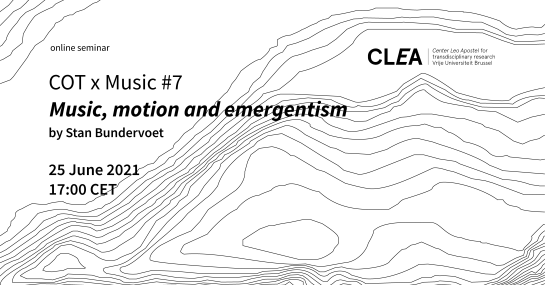The ideas for this talk spring from my artistic research as a composer and explore the aptness of music or music perception as a tool for the analysis of complex dynamical systems (COT?). There are multiple reasons why the ear might be a better candidates than the eye when trying to observe and understand non linear interactions, emergent properties and wave-like energies intuitively. Many of them can be traced back to the motion sensing capacities of our auditory system - music perception in specific-, and perhaps its connection to sensory-motor control mechanisms.
The talk touches upon topics ranging from cognitive musicology, acoustics, to the anatomy and neurology of the auditory system. I'll try to show some examples of analysis by synthesis. I plan to reverse the question also and probe the aptness of complex dynamical systems from within a composers perspective and see if a deeper connection can be found.
Zoom meeting: https://zoom.us/j/94846157547?pwd=OWpSbjJKU1lhT3JRUWFsNU1abnRNQT09
Meeting ID: 948 4615 7547
Passcode: 6Uv5JS
Facebook event: https://fb.me/e/1Es8WSkd8
Bio:Stan Bundervoet is a passionate musician and a researcher with a broad scope of interests centered around the theme of music. Past collaborations include music educational projects with Anima Eterna, Ictus, NOB, research projects at CLEA and IPEM and the centre for experimental music GMEA.Presentation slides: shorturl.at/bwGOS

The COT x Music online seminars discuss the possible applications of reaction networks - in particular the Chemical Organization Theory (COT) - to generative systems in art, focusing on music & sound. This series is an international collaboration around the research project "The Origins of Goal-directedness: a Formal Scenario based on Chemical Organization Theory and Cybernetics" led by the Center Leo Apostel, Vrije Universiteit Brussels and funded by the John Templeton Foundation.
Read more about the seminars here: https://clea.research.vub.be/en/cot-x-musicand about the research project: https://clea.research.vub.be/en/origins-of-goal-directedness
